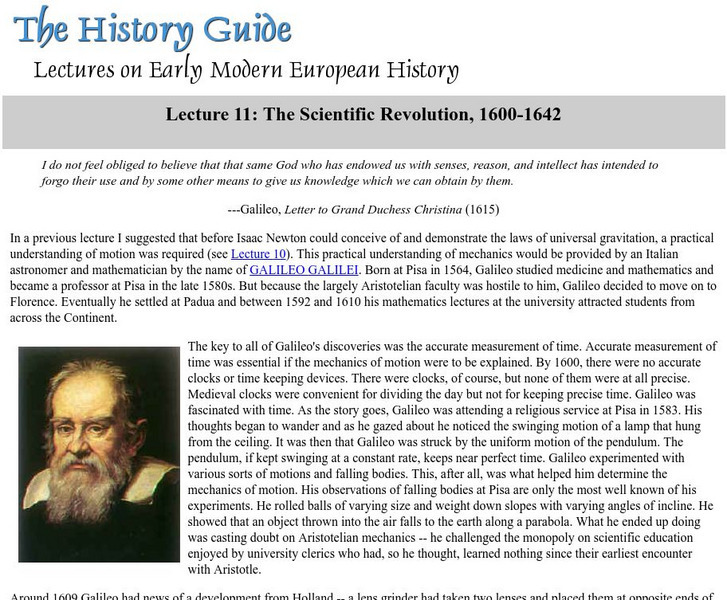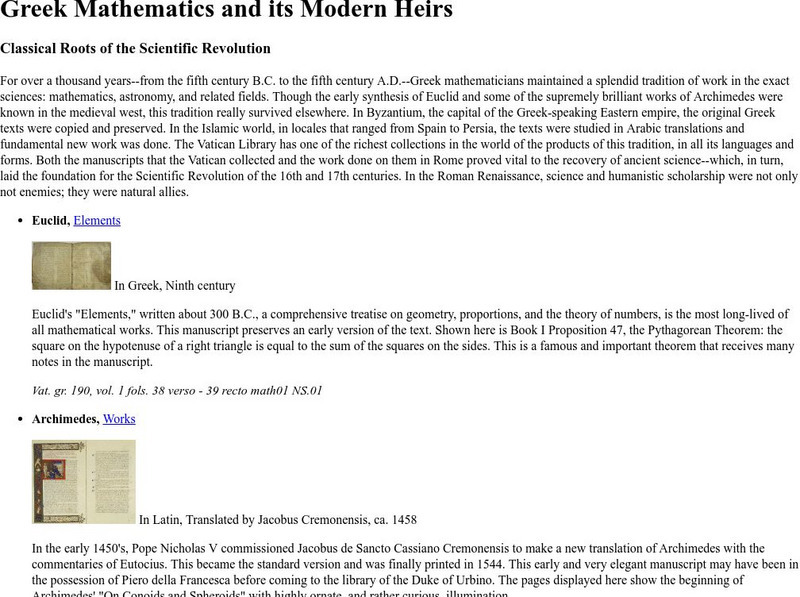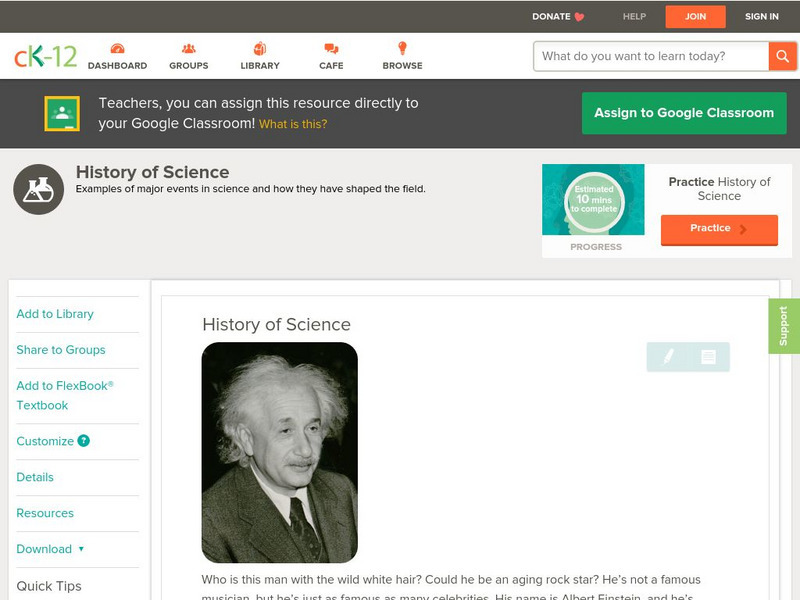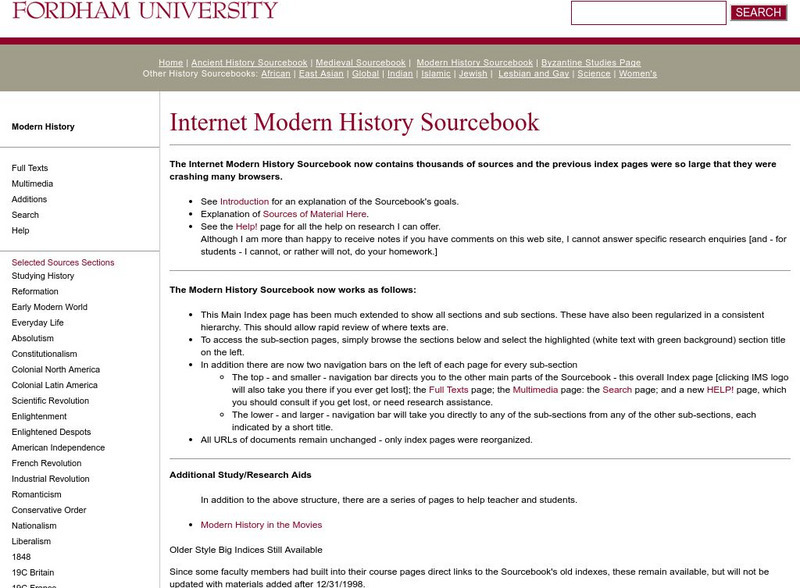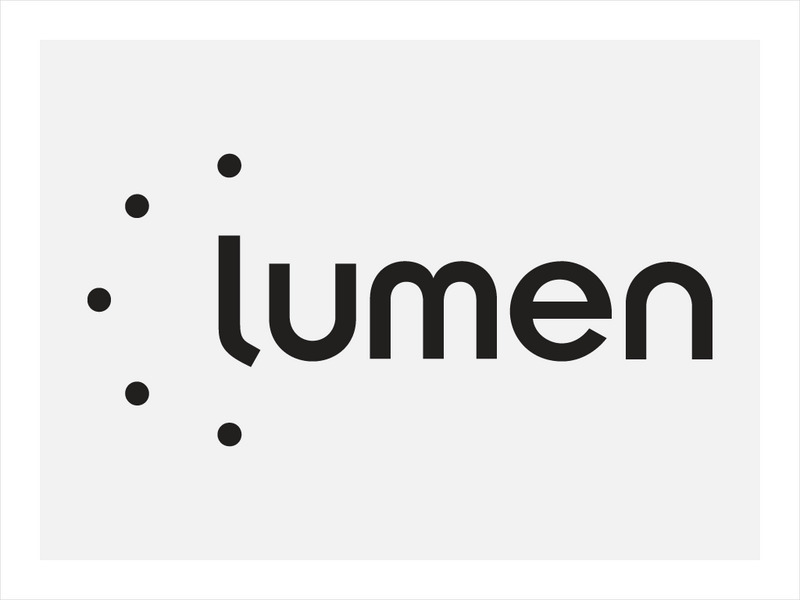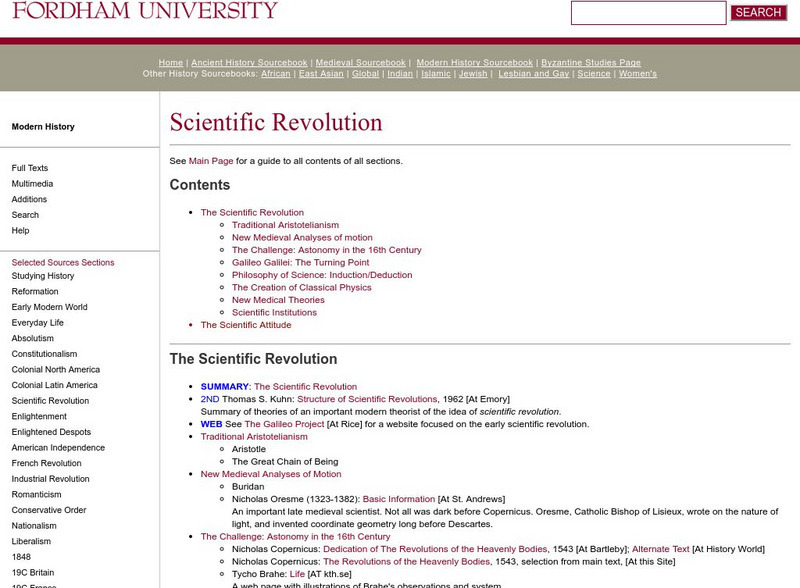Georgia Department of Education
Ga Virtual Learning: Ap European History: Scientific Revolution
AP European History learning module on the Scientific Revolution.
Tom Richey
Tom Richey: The Scientific Revolution and the Enlightenment
Learning module in which students study the Scientific Revolution and explore the dramatic change in the way people thought about the world during the 17th and 18th Centuries. Unit includes videos, unit guide and primary sources.
Steven Kreis, PhD
The History Guide: The Scientific Revolution, 1642 1730
Get a historical look at the scientific revolution with this webpage. See the changes in society that occurred as a result of the new way of thinking brought about by this revolution. Also, learn about Isaac Newton who is described to...
Steven Kreis, PhD
The History Guide: The Scientific Revolution, 1600 1642
A survey of Galileo's discoveries that not only helped other scientists like Newton develop their ideas but challenged the scientific thinking of the time. Also includes a look at how Galileo was not accepted by society because of his...
BBC
Bbc News: The Road to Riches: The 2nd Industrial Revolution
A brief look at some of the inventions and technologies associated with the second industrial revolution, which came into existence thanks to the new discoveries made by chemists and physicists. Offers a look at how these advancements...
Other
Modern World History: The Industrial Revolution Begins in England (1760 1850)
In this textbook unit, students learn the reasons why the Industrial Revolution took root in England first, and the innovations that made this possible. These included textile inventions such as the flying shuttle and the spinning jenny,...
Khan Academy
Khan Academy: World History: 1450 1750 Renaissance and Reformation
Links to embedded videos and other information about World History: 1450 - 1750 Renaissance and Reformation including the The Protestant Reformation, Scientific Revolution and Enlightenment, Spanish and Portuguese Empires, Mughal rule in...
National High Magnetic Field Laboratory
Magnet Academy: Timeline of Electricity and Magnetism: 1600 1699
The Scientific Revolution takes hold, facilitating the groundbreaking work of luminaries such as William Gilbert, who took the first truly scientific approach to the study of magnetism and electricity and wrote extensively of his findings.
ClassFlow
Class Flow: Science Revolution
[Free Registration/Login Required] This flipchart discusses What occurred in the 1500's to change science? Changes in science beliefs began with the universe and continued to development of the scientific method.
Story Behind the Science
Story Behind the Science: Pendulum Motion, Time, and Shape of Earth [Pdf]
Article outlining the scientific history behind the evolution of theories about measuring time based on the movement of a pendulum, and about how gravity would impact a pendulum's movement depending on one's proximity to the Earth's...
US Geological Survey
U.s. Geological Survey: 1906 Marked the Dawn of the Scientific Revolution
This site contains information about we have learned about the San Andreas Fault since 1906.
ibiblio
Ibiblio: Greek Mathematics and Its Modern Heirs
This ibiblio.org site discusses the "Classical roots of the scientific revolution," with concentration on the Greek mathematicians from the 5th century BC to the 5th century AD who "Maintained a splendid tradition of work in the exact...
ClassFlow
Class Flow: Women in Science
[Free Registration/Login Required] In this flipchart, students will learn about European History, specifically on the Scientific Revolution and skill practice on Document Based Questions (Point of View and Grouping Documents).
CK-12 Foundation
Ck 12: Physical Science: History of Science
[Free Registration/Login may be required to access all resource tools.] Explores the evolution of science, major contributions in the history of science, and the scientific revolution.
British Library
British Library: Discovering Literature: The Enlightenment
The Enlightenment's emphasis on reason shaped philosophical, political, and scientific discourse from the late 17th to the early 19th century. This article traces the Enlightenment back to its roots in the aftermath of the Civil War, and...
Country Studies US
Country Studies: Revolution in Agriculture
This site describes how even though industry was expanding in the U.S., agriculture still remained the most important occupational sector in the US. As the population grew, farmers in the U.S. had to find ways to meet the explosive...
Internet History Sourcebooks Project
Fordham University: Modern History Sourcebook
A rich Fordham University site of primary source material that include full-text, and multimedia sites. There are additional study and research guides such as Modern History in the Movies.
Other
Stanford University Press:institutionalization of Science in Europe,1650 to 1850
A description of chapter 3 from a book titled Economic Evolution and Revolution in Historical Time by Paul W. Rhode, Joshua L. Rosenbloom, and David F. Weiman. The chapter looks at how the Second Industrial Revolution gave rise to...
Lumen Learning
Lumen: Boundless u.s. History: Manufacturing
A section of a textbook on U.S. history. It presents key concepts on manufacturing and its mechanization during the Second Industrial Revolution, vocabulary that students need to understand, several paragraphs of information, and links...
University of Virginia
University of Virginia: Galen
An incredibly interesting site on an amazing force in early medicine, Galen. This site gives a biography and explains some of Galen's beliefs.
Internet History Sourcebooks Project
Fordham University: Modern History Sourcebook: Isaac Newton
This site from Fordham University links to excerpts of Newton's major works. Please scroll down to find the section on Newton titled "The Creation of Classical Physics." You will be able to actually read some of Newton's work! Read...
Internet History Sourcebooks Project
Fordham University: Modern History Sourcebook: Letters on Newton
An interesting site from Fordham University that provides letters Voltaire wrote regarding Newton and his work.
Internet History Sourcebooks Project
Fordham University: Modern History Sourcebook: Principles of Natural Philosophy
This site from Fordham University is an exerpt from Newton's famous "Principia."






